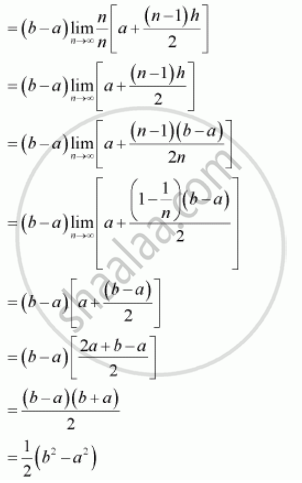Advertisements
Advertisements
प्रश्न
Evaluate the following definite integrals as limit of sums.
`int_a^b x dx`
उत्तर


APPEARS IN
संबंधित प्रश्न
Evaluate `int_1^3(e^(2-3x)+x^2+1)dx` as a limit of sum.
Evaluate the following definite integrals as limit of sums.
`int_0^5 (x+1) dx`
Evaluate the following definite integrals as limit of sums.
`int_1^4 (x^2 - x) dx`
Evaluate the following definite integrals as limit of sums.
`int_0^4 (x + e^(2x)) dx`
Evaluate the definite integral:
`int_(pi/2)^pi e^x ((1-sinx)/(1-cos x)) dx`
Evaluate the definite integral:
`int_(pi/6)^(pi/3) (sin x + cosx)/sqrt(sin 2x) dx`
Prove the following:
`int_(-1)^1 x^17 cos^4 xdx = 0`
Prove the following:
`int_0^(pi/4) 2 tan^3 xdx = 1 - log 2`
Prove the following:
`int_0^1sin^(-1) xdx = pi/2 - 1`
If f (a + b - x) = f (x), then `int_a^b x f(x )dx` is equal to ______.
if `int_0^k 1/(2+ 8x^2) dx = pi/16` then the value of k is ________.
(A) `1/2`
(B) `1/3`
(C) `1/4`
(D) `1/5`
Evaluate : `int_1^3 (x^2 + 3x + e^x) dx` as the limit of the sum.
\[\int\frac{\sqrt{\tan x}}{\sin x \cos x} dx\]
Using L’Hospital Rule, evaluate: `lim_(x->0) (8^x - 4^x)/(4x
)`
Evaluate `int_1^4 ( 1+ x +e^(2x)) dx` as limit of sums.
Solve: (x2 – yx2) dy + (y2 + xy2) dx = 0
Evaluate:
`int (sin"x"+cos"x")/(sqrt(9+16sin2"x")) "dx"`
Evaluate `int_(-1)^2 (7x - 5)"d"x` as a limit of sums
Evaluate the following:
`int_0^(pi/2) (tan x)/(1 + "m"^2 tan^2x) "d"x`
If f" = C, C ≠ 0, where C is a constant, then the value of `lim_(x -> 0) (f(x) - 2f (2x) + 3f (3x))/x^2` is
Left `f(x) = {{:(1",", "if x is rational number"),(0",", "if x is irrational number"):}`. The value `fof (sqrt(3))` is
The limit of the function defined by `f(x) = {{:(|x|/x",", if x ≠ 0),(0",", "otherwisw"):}`
`lim_(n→∞){(1 + 1/n^2)^(2/n^2)(1 + 2^2/n^2)^(4/n^2)(1 + 3^2/n^2)^(6/n^2) ...(1 + n^2/n^2)^((2n)/n^2)}` is equal to ______.
